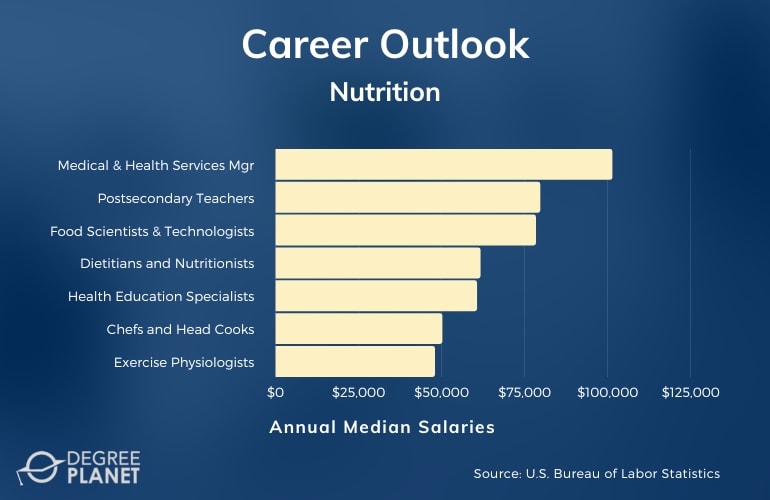Pursuing a masters in nutrition is a strategic option if you want to study the ways in which nutrition affects our overall health.

This program teaches you how to critically analyze a person’s health and provide them with dietary solutions to their ailments. A master’s in nutrition could also help you advance your career in healthcare, research, or education.
Editorial Listing ShortCode:
Read on to discover some of the educational and professional outcomes of a graduate program in nutrition.
Online Masters in Nutrition Programs

Nutrition plays a vital role in a person’s health and wellness. People today are living longer, so the desire to ensure they’re protecting their health has increased. This has subsequently influenced the labor force, making careers in nutrition more desirable.
A masters in nutrition science teaches aspiring nutritionists and dietitians how to treat patients or clients by assessing their current nutrition. You’re also taught how to create specific treatment plans that are intended to guide someone into making healthier food choices.
Editorial Listing ShortCode:
You’ll also study every aspect of nutrition so that you can learn how to become a nutritionist and a well-rounded professional. Your curriculum will likely teach you about food composition and the psychology that influences a person’s eating habits. Many graduates enter either the public or private sector after graduation. They often work in community health programs, colleges, fitness centers, or nutrition clinics.
Sample career paths include:
- Nutritionist
- Dietitian
- Postsecondary teacher
- Food scientist
- Nutrition education specialist
As can be expected, you’ll be required to take a variety of core courses directly related to your major. That said, some programs allow you to take elective courses that could support your specialized interests.
You’ll likely study subjects like:
- Nutrition science
- Nutrition education
- Food regulations
- Nutrition counseling
Obtaining a masters degree in nutrition could be a rewarding path if you value healthy eating and have the desire to help others with their dietary needs.
Nutrition Careers and Salaries

A master’s in nutrition can help prepare you to advance your career in health care, specifically in the field of nutrition or dietetics. Those who enter a master’s in nutrition program usually have the desire to help others by making adjustments in their daily eating habits.
Students can hone their critical thinking and leadership skills while developing their expertise in all aspects of nutrition. This could make them an asset in the healthcare field, whether it be as a nutritionist or health education teacher.
According to the Bureau of Labor Statistics, here are some potential career paths related to the study of nutrition.
| Careers | Annual Median Salaries |
| Medical and Health Services Managers | $101,340 |
| Postsecondary Teachers | $79,640 |
| Food Scientists and Technologists | $78,340 |
| Dietitians and Nutritionists | $61,650 |
| Health Education Specialists | $60,600 |
| Chefs and Head Cooks | $50,160 |
| Exercise Physiologists | $47,940 |
| Recreational Therapists | $47,940 |
| Food Science Technicians | $46,590 |
| Fitness Trainers and Instructions | $40,700 |
It’s important to remember that no career can be guaranteed. There are many factors that can determine your qualifications and influence the hiring process. Despite its specific focus, a masters degree in nutrition can lead to opportunities in various professional settings.
Editorial Listing ShortCode:
Many graduates do become nutritionists or dietetics, but it’s also common for graduates to enter community service organizations, schools, and food companies. Others go on to teach or enter the field of food science.
MS in Nutrition Curriculum & Courses

A master’s program in nutrition will primarily focus on building a robust knowledge of all aspects of nutrition. This type of program requires you to complete a variety of core classes and elective courses. Here are some example courses:
- Research in Nutrition: You’ll familiarize yourself with the research principles related to nutrition and dietetics.
- Nutritional Biochemistry: This course introduces you to the minerals, amino acids, and vitamins that the human body needs.
- Nutritional Program Design: This course will teach you how to create nutritional programs that are tailor-made for a given population.
- Behavior Change in Health: You can learn how to recognize the negative lifestyle choices that are affecting a patient’s health and how to change them.
- Nutrition and Disease Prevention: This course will introduce you to the ways nutrition can prevent chronic diseases.
- Community Nutrition: This course teaches you about US populations that are susceptible to an inadequate diet and how to combat the challenges they face.
- Nutrition and Metabolism: This course introduces you to the basic nutritional requirements for overall health.
- Early Childhood Nutrition Education: You’ll learn the nutritional needs of children and how to develop an educational program.
- Nutrition for Health and Physical Fitness: This course teaches you about the biochemical and physiological significance of nutrition in regard to health.
- Food Science: This course takes an experimental approach to studying food preparation.
These courses can vary depending on your chosen program. Many masters programs also offer degree specializations.
How to Choose a Masters in Nutrition Online Program

Here are some of the factors to consider when choosing the school and nutrition masters program that’s right for you:
- Cost. The cost of attendance is often a large determining factor. You can also compare financial aid options between schools.
- Program format. Some online programs offer a more flexible format, which may prove beneficial to students with busy schedules.
- Accreditation. Accreditation testifies to the standard of your education and may make you more desirable to employers. You can also check with your state’s licensing board to see if an accredited education is a requirement.
- Support services. Many students want the best support system possible when earning their graduate degree. You may want to explore and compare the student support services offered by various schools.
- Location. Many students consider the location of their school when applying because it may provide added convenience to their education. When exploring online programs, it’s helpful to verify whether there are any in-person requirements throughout the program.
Everyone’s circumstances are different. Considering the factors that are most important to you could help you make the best decision for your needs and goals.
Admissions Requirements

Here are some general admissions requirements you can expect to find from a nutrition masters program:
- Application fee
- Bachelor’s degree
- Minimum college GPA of 3.0, on average
- Official college transcripts
- GRE or GMAT scores (only some schools require them)
Every school has its own admissions requirements, so it’s helpful to research the specific admissions criteria at your school of your choice. You can also contact your prospective school’s admissions office to ask any questions you may have.
Nutrition Graduate Programs Accreditation

If you want to ensure that you’re getting the most value from your work, you may want to consider attending a school that holds regional accreditation.
Editorial Listing ShortCode:
A college or university can earn regional accreditation when it passes a series of evaluations that affirm the school’s high standard of education. Having a degree from an accredited university can help make you more marketable to employers, and an accredited education may be required for certification or licensure in some states.
Financial Aid and Scholarships

Many students have to pursue financial aid to meet the cost of their education. Fortunately, there are many resources that help qualifying students reduce the upfront cost of their education.
The primary form of financial aid is federal aid. This aid is often administered by the government in the form of student loans, grants, and work-study programs. You can fill out the FASFA to see if you qualify. Other forms of aid include scholarships and grants. These can be offered by public and private organizations as well as schools. You can also see if your work offers any tuition benefits.
What Can You Do with a Masters in Nutrition?

Those with a master’s degree in nutrition may enter a variety of professional settings in the public or private sector. Many graduates go on to work as nutritionists or registered dietitians. There are many specialty areas that these professionals may focus on, including healthcare, sports, fitness, and food science.
Many nutrition professionals find themselves working in community service organizations, schools, or healthcare facilities. Depending on their specialty, some graduates pursue roles as food scientists or health education specialists.
How Long Does It Take to Get a Masters Degree in Nutrition Online?

Those who attend nutrition masters programs online can expect to take between 30 and 36 credits. Most masters programs can be completed in 1 to 2 years with full-time study, but however long it takes you may depend on your individual circumstances.
For instance, if you enroll in your program part-time it will likely take you longer to complete. A thesis requirement could extend your completion time as well. Online programs can offer more flexibility to your schedule, but they may also offer accelerated tracks, giving you the opportunity to finish sooner.
Can You Get a Master Degree in Nutrition with an Unrelated Bachelor’s Degree?

Yes, you can attain a masters degree in nutrition without having a related degree. There are a variety of masters programs in nutrition that allow you to receive this education regardless of whether you have a related degree.
You can look for either a coordinated or traditional program for your masters in nutrition. A coordinated program is designed for people who want a career change and don’t have a related undergraduate degree. A traditional program is designed for those who are already practicing nutritionists.
Editorial Listing ShortCode:
The coordinated program features graduate-level coursework under supervision. A traditional program provides more advanced knowledge and can help prepare professionals for senior or leadership roles, like chief clinical dietitian.
What’s the Difference Between a Dietetics vs. Nutrition Masters Degree?
Here are some of the differences between a master’s in nutrition and a master’s in dietetics.
| Masters in Dietetics | Masters in Nutrition |
|
|
It’s helpful to do your research about these programs to ensure you choose the path that best fits your goals.
Is a Master’s Degree in Nutrition Worth It?

Yes, a master’s degree in nutrition is worth it for many professionals. This career allows those with an interest in health and wellness to provide valuable, life-changing aid.
According to the Bureau of Labor Statistics, employment of nutritionists and dietitians is expected to grow 7% over the next ten years. This is considered about as fast as the average for overall job growth. Nutrition is an in-demand occupation, and there are a range of specialties you can choose to pursue.
Editorial Listing ShortCode:
Some professionals go on to become clinical dietitians, sports nutritionists, food scientists or technologists, or nutrition education specialists.
Universities Offering Online Masters in Nutrition Degree Programs
Methodology: The following school list is in alphabetical order. To be included, a college or university must be regionally accredited and offer degree programs online or in a hybrid format.

Adelphi University offers a Master of Science in Nutrition. This program is designed to help students develop advanced scientific knowledge and professional credentials to advance in their careers. Students can attend classes 100% online. Many graduates pursue educational, leadership, and practitioner roles in settings like hospitals, schools, and public health organizations.
Adelphi is accredited by the Middle States Commission on Higher Education.

American University offers a Master of Science in Nutrition Education. Students who are passionate about promoting health and wellness in their communities may find an excellent next step in this program. Many students can complete the program’s 18 required credits in just 1 year. The program utilizes a fully online learning format.
American University is accredited by the Middle States Commission on Higher Education.

The Master of Science in Nutritional Science at Arizona State University offers a focus in Dietetics. This curriculum is intended to prepare students for Registered Dietician certification exams. Classes meet online, and each one is 7.5 weeks long. Courses cover key topics like research methods, metabolic syndromes, ethics and policy in nutrition, and nutrigenomics.
ASU is accredited by the Higher Learning Commission.

Ball State University offers a Master of Science in Nutrition and Dietetics. Graduates often pursue careers as dieticians, nutritionists, health coaches, wellness coordinators, or fitness managers. The program requires the completion of 36 credit hours and utilizes an online learning model. Students culminate their studies with either a thesis or an approved project.
Ball State is accredited by the Higher Learning Commission.

Lamar University offers a Master of Science in Nutrition. This concentration may be an ideal fit for students interested in higher-level and clinical positions. On average, students can complete the program’s 30 required credits in 12 months. Students can select electives in sports nutrition, prenatal nutrition, eating disorders, or food preparation to cater their education to their interests.
Lamar University is accredited by the Southern Association of Colleges and Schools Commission on Colleges.

Liberty University offers a Master of Science in Nutrition. Graduates often pursue nutrition-based careers in settings like private practices, community centers, nonprofit organizations, or holistic health centers. Students have the potential to transfer in up to 50% of their 36 required credits from outside institutions. The program can typically be finished in 1 year.
Liberty University is accredited by the Southern Association of Colleges and Schools Commission on Colleges.

Logan University offers an online program for a Master of Science in Applied Nutrition and Dietetics. This program is designed to help students develop the knowledge needed to test for their registered dietician certification. To graduate, students must complete a minimum of 42 credits and 30 internship hours in the field. Potential courses include Natural Therapies, Lifecycle Nutrition, and Research Methods.
Logan University is accredited by the Higher Learning Commission.

North Carolina State University offers a Master of Nutrition. Students can select an emphasis in either Human Nutrition or Feed Science. The program requires the completion of 36 total credit hours from coursework, a practicum, and a culminating project. Upon graduation, many students pursue health promotion roles in settings like corporations, healthcare facilities, or nonprofit organizations.
North Carolina State University is accredited by the Southern Association of Colleges and Schools Commission on Colleges.

Northeast College of Health Sciences offers a Master of Science in Applied Clinical Nutrition. The curriculum emphasizes holistic wellness and whole food nutrition. All classes meet fully online. Students in the accelerated track can often complete the degree in just 16 months, while students in the standard track usually finish their studies in 24 months.
Northeast College of Health Sciences is accredited by the Middle States Commission on Higher Education.

Tufts University offers a Master of Nutrition Science and Policy. Diverse elective options allow students to tailor their studies to their personal goals. The program’s blended online and on-campus learning format is designed to accommodate the schedules of busy working professionals. Full-time students often finish in 1 to 2 years, and part-time students typically graduate in 2 to 3 years.
Tufts University is accredited by the New England Association of Schools and Colleges.

The University of Alabama offers a Master of Science in Human Nutrition. This program is designed for students pursuing advanced credentials or careers as nutrition practitioners. It requires the completion of 30 credit hours and allows students to select a General, Community, or Clinical specialization. Students can complete their studies 100% online.
The University of Alabama is accredited by the Southern Association of Colleges and Schools Commission on Colleges.

The University of Arizona offers a Professional Science Master’s in Applied Nutrition and Wellness. The curriculum covers topics like statistical methods, metabolism, clinical conditions, nutrigenomics, body composition, and nutrition assessment. Classes meet primarily online. To graduate, students must complete a minimum of 30 credits and 270 hours of practicum experience at an approved clinical institution.
The University of Arizona is accredited by the Higher Learning Commission.

The University of Bridgeport offers a Master of Science in Nutrition. This curriculum aims to help students develop the skills needed to offer patient-centered care and promote health in diverse settings. The program can potentially be completed in 23 months of full-time study. All classes are housed entirely online.
The University of Bridgeport is accredited by the New England Commission of Higher Education.

The University of Houston offers a Master of Science in Nutrition that can be completed conveniently online. This program may be an ideal next step for students want to deepen their expertise in clinical nutrition, clinical management, and health and wellness. It requires the completion of 36 credit hours.
The University of Houston is accredited by the Southern Association of Colleges and Schools Commission on Colleges.

The University of North Dakota offers a Master of Science in Nutrition. The curriculum aims to teach students how to use nutrition to prevent and treat a range of health issues in their clients. The program is housed 100% online. Many students can complete the program’s 30 required credit hours in 2 years of full-time attendance.
UND is accredited by the Higher Learning Commission.
Getting Your Master of Nutrition Online

A master’s degree in nutrition can expand your career opportunities and help you develop in-demand skill sets that can impact others’ overall health.
Whether it be through medical practice or education, the work of nutrition professionals is valuable to the lives of many. If you have a passion for all things food, including the psychology behind why people eat what they do and how it affects them, then pursuing a masters in nutrition may be right for you.
If you’re interested in taking your education and profession to the next level, then you can begin researching accredited universities today to find the online nutrition degree and concentration that best suit your goals.

